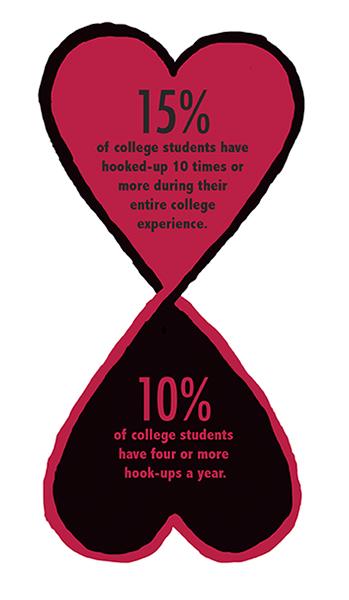Hookup culture does not equal feminism

Sourced from “The Promise and Peril of Hookup Culture,” presented by Professor Lisa Wade of Occidental College
“Hookup culture” has become a common phrase in today’s society. It describes a culture in which many people have casual sexual experiences with one another, often looking for encounters with no real emotional bond or relationship. Hookup culture is practiced by people of any age, gender, race, political belief and so on. It is important to understand that one’s participation in hookup culture does not determine whether or not they are a feminist.
A common misconception people have is that anyone who considers themselves to be a feminist must participate in and enjoy this culture, as feminists should supposedly feel confident and dominant enough to engage in casual relationships for personal pleasure.
Feminism, however, is not contingent on this. As long as you feel empowered by the choices you are making and the way you live your life, you are acting in accordance with feminist philosophy.
On many college campuses, including Tulane, hookup culture is very prominent. At times, it may even appear to replace the traditional dating scene completely. For those who enjoy this system without negative emotional impact, that’s great. Keep doing what you enjoy and take part in whatever experiences feel right for you. For those who do not find this culture compelling or enjoyable, it is important to remember that you have no obligation to participate in it. Even if you identify as a liberal feminist and feel the need to challenge conservative ideas about sex and relationships, physically participating in something that makes you feel bad is not healthy.
The truth is that while many people feel empowered by today’s hookup culture, many others would much rather spend their time going on actual dates and allowing themselves to feel attached to their sexual partners. Others identify on the asexual or aromantic spectrum and may not feel any desire to date or engage in sexual behaviors at all. Many college students have a difficult time coming to terms with this because of social norms, which can be exacerbated by their feminist identities. This pressure may be greater for men not wishing to participate in hookup culture but who are encouraged to aggressively pursue it by gender expectations.
Everyone must recognize that if you are consistently subjecting yourself to sexual experiences that you do not enjoy just because you feel obligated to do so, then you are neither respecting your body nor your right to make decisions for yourself. Feminism encourages an understanding that no matter your gender identity, everyone should do what makes them comfortable, even if society sends different signals.
This is an opinion article and does not necessarily reflect the views of The Tulane Hullabaloo. Robin is a freshman at Newcomb-Tulane College. She can be reached at [email protected].
Leave a Comment
Your donation will support the student journalists of Tulane University. Your contribution will allow us to purchase equipment and cover our annual website hosting costs.
















Omobolaji • Sep 26, 2021 at 9:55 pm
Good
kwaku Jacob • Jan 3, 2019 at 6:55 am
pls I need sugar mummy